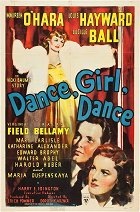Cinematography:
Russell MettyComposer:
Edward WardCast:
Maureen O'Hara, Louis Hayward, Lucille Ball, Virginia Field, Ralph Bellamy, Maria Ouspenskaya, Mary Carlisle, Katharine Alexander, Edward Brophy, Walter Abel (more)VOD (1)
Plots(1)
Dorothy Arzner, the sole woman to work as a director in the Hollywood studio system of the 1930s and early ’40s, brings a subversive feminist sensibility to this juicily entertaining backstage melodrama. A behind-the-footlights look at friendship, jealousy, and ambition in the ruthless world of show business, Dance, Girl, Dance follows the intertwining fates of two chorus girls: a starry-eyed dancer (Maureen O’Hara) who dreams of making it as a ballerina and the brassy gold digger (a scene-stealing Lucille Ball) who becomes her rival both on the stage and in love. The rare Hollywood film of the era to deal seriously with issues of female artistic struggle and self-actualization, Arzner’s film is a rich, fascinating statement from an auteur decades ahead of her time. (Criterion)
(more)Reviews (2)
It's not quite the exceptional film that the authors of "1001 Movies You Must See Before You Die" make it out to be, but it still has a good concept and great characters, especially the female ones, of course. This is the element that makes the film interesting, and it reaches its peak, unfortunately, only in the final scenes. Otherwise, this is unlikely to become one of your favorite films.
()
Like Stage Door, in which Katharine Hepburn and Ginger Rogers are at each other’s throats, Dance, Girl, Dance is an absolutely female film (a woman, who remotely resembles Judy’s Russian dance teacher, was also behind the camera). The twenty-year-old Maureen O’Hara superbly portrays a naïve and innocent girl who, however, doesn’t lack a spark in her eye. Here most striking rival, who is mainly better at selling herself, is played by Lucille Ball, star of the sitcom I Love Lucy. Much more than a comedy, the film is a more or less believable drama about the difficulties that a woman – no matter how talented – had to (and still has to) face in a man’s world. Of course, the highest aim is represented by a skyscraper, clearly a phallic symbol. The only minor satisfaction for Judy, an impoverished and humiliated orphan, is a monologue before the end of the film, when she gives the loathsome voyeurs a piece of her mind. At least verbally. The camerawork, editing and directing are flawless in my opinion, as befits classic Hollywood. Appendix: With the classic Hollywood approach of “everything serves the story”, I was most pleased by the scene with an umbrella, when it was clear that it would be used, but we’re left in suspense as to when. 75%
()


Ads